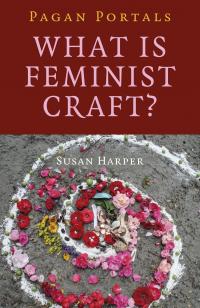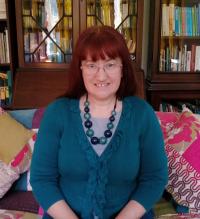
 A few years ago, I was babysitting a friend’s Occult Bookshop – Treadwells, in London. A young seeker came into the shop and began browsing around the shop. Each new treasure she found caused her eyes to open up, just a little bit wider, and I could see her head was full of questions. Finally, as she reached the Witchcraft shelf, she couldn’t contain herself any longer. Turning to me, she bubbled over completely. “Do you believe in witches?” She asked, and with barely a pause for breath, “Are you a witch?” I probably looked like a startled rabbit while I tried to compose my thoughts. I come from a line of Gardnerian witches. If you are in the States you may see it referred to on Internet forums as BTW – British Traditional Witchcraft – but in the UK we just think of ourselves as Wiccan, or witches. Our tradition is oath bound, so in most situations if someone asks a question, Wiccans will give a vague answer, demur, or very artfully change the topic as quickly as possible, particularly if they are not “out” in public. However, when faced with this particular seeker, on this particular day, I had two problems. Firstly, I was sitting behind the counter in an occult bookshop which meant I couldn’t deny all knowledge, and secondly, when I am asked a direct question, I have an inability to lie. This does not mean I will spill all of my oath-bound-beans to any old Tom, Dick or Harriet, but on this occasion I replied, that yes, I believe in witches, and yes, I am one. And the question that came up next floored me even more.
A few years ago, I was babysitting a friend’s Occult Bookshop – Treadwells, in London. A young seeker came into the shop and began browsing around the shop. Each new treasure she found caused her eyes to open up, just a little bit wider, and I could see her head was full of questions. Finally, as she reached the Witchcraft shelf, she couldn’t contain herself any longer. Turning to me, she bubbled over completely. “Do you believe in witches?” She asked, and with barely a pause for breath, “Are you a witch?” I probably looked like a startled rabbit while I tried to compose my thoughts. I come from a line of Gardnerian witches. If you are in the States you may see it referred to on Internet forums as BTW – British Traditional Witchcraft – but in the UK we just think of ourselves as Wiccan, or witches. Our tradition is oath bound, so in most situations if someone asks a question, Wiccans will give a vague answer, demur, or very artfully change the topic as quickly as possible, particularly if they are not “out” in public. However, when faced with this particular seeker, on this particular day, I had two problems. Firstly, I was sitting behind the counter in an occult bookshop which meant I couldn’t deny all knowledge, and secondly, when I am asked a direct question, I have an inability to lie. This does not mean I will spill all of my oath-bound-beans to any old Tom, Dick or Harriet, but on this occasion I replied, that yes, I believe in witches, and yes, I am one. And the question that came up next floored me even more.
“How can you practice witchcraft when you live in the city?” she asked, “I thought witches had to live in the countryside.” This is a question that often echoes in my mind, and I often return to it in my writing. Although I grew up in a very remote part of Dartmoor, I have lived in London for nearly twenty years now, and have a very rich and varied spiritual path, even though I am living in such urban surroundings, and practicing a nature-based faith. So, for those of you who may be simply curious, or those of you struggling to find your way in similar circumstances, in this chapter I want to unpick some of the elements at play in successfully practicing Urban Witchcraft. I don’t think that young seeker was alone in thinking that in order to be a “proper witch” we must live in a cottage on the edge of a wood somewhere like Granny Weatherwax, and while that might be appealing for all sorts of reasons, the economic realities of living in contemporary society often mean that this is a dream that is not possible for many of us to manifest.
You may be tethered to the city because of work, or study, or family members. Or you may simply feel all at sea in a truly rural setting. Some people feel less safe in the wilder lands where there are less people around. Growing up on Dartmoor, but being drawn to live in our capital city, I had to go through a process of learning to find peace here. So, in the hopes that it may help you along, and enable you to find some peace amidst all the dust and noise, here are some of the tricks I have learned over the years for practicing Urban Witchcraft. Some of them may seem obvious, and many of them could apply to rural Witchcraft as well as urban, but this is really a reminder to apply the same principles in an urban setting.
Find Nature
It may seem obvious to some of you, but the first essential in practicing Urban Witchcraft is in finding nature. Even in the most urban parts of the city, nature is always around us; sometimes you just need to look differently to find it. For instance, London is blessed with a plethora of trees that line every pavement, but often the leaf canopy is higher than we are, and we may forget to look up and see the green. One of the offices I worked in was on the fourth floor of a building, which gave me the perfect vantage point. If I looked out of the window I was sitting right in amongst the leaves. Working higher up also gave me a spectacular vantage point for some of the most glorious skyscapes I have ever seen. Make a point of observing your surroundings as much as possible, and make sure you are really looking at the details.
Closer to the ground, if you pay attention to what’s around your feet, you will also get some surprises. The grass verges that line the main road I live on are clustered with tiny outbreaks of wild chamomile. Map out your local area and make sure you know where things are – the elderflower tree that grows round the corner, the rosemary bushes that profuse the local park, the place where you can safely gather fresh nettles, away from the pollution of the busy roads that criss-cross the land we live in.
While city parks also allow for some very special close encounters with nature and wildlife (I have come closer to herons and foxes in the centre of London than I did on Dartmoor) there are also areas of green belt that rove around the outer edges of the city. If you need to find these spaces, you can scout out footpaths by checking the website of your local authority for local walking information.
There will be footpaths and woodlands and wilder places there somewhere, usually on the outskirts and the edgelands, or near rivers and canals. Go there as often as you can, and just watch the turning of the seasons. See what is in bloom, and when, and get to know the land as if it is another one of your companions. The city is full of history and soul, and there are lots of ways to connect with it, even if it is tightly wrapped in tarmac, and hedged in with wire fences.
Your area may be choked in litter, but there may also be schemes you can volunteer with to improve the environment. Perhaps the estate you live on has a neighborhood scheme for conservation? If so, volunteer! It is an act of service to your home that will help deepen your ties.
Finding Solitude
This one is harder to do than finding nature, but it is not impossible. One of the elements of Dartmoor that I miss more than anything is the solitude. If you are an extrovert and recharge by being in the company of others, then you are already pre-set for city life. If, like me, you need peace and quiet, then there are a few ways of finding it. When I worked in Central London, each time I was in rush hour or out in the street at lunch times, I felt like I was going to get swallowed up or run over by the crowd. The vast numbers of people, all moving in a certain direction and not pausing to let anyone through was quite intimidating. So I learned to find the back streets and the quiet spaces. If I am walking, I will make a point of moving at my own pace, to make sure I am fully mindful and present in what I am doing in that moment. That is how you spot the details of nature around you.
Another element to finding solitude is to walk at times when most people are still tucked up in their beds. I walk as early in the morning as I can, as I encounter less people and more wildlife then. Also, it is much easier to connect to the Divine in solitude. The gods – in whatever form you relate to them – are communicating with us all the time, through nature and through your own inner voice – that quiet voice you can only hear when you make yourself still and allow it to speak. That is why we need the peace and quiet, to see the signs that are all around us, and to hear our own inner prompting.
Embracing Your Inner Weirdo
I once said to my husband that I was worried about meeting strange people in the woods, he laughed and said, “Don’t worry – you are the strange people in the woods!”
In some ways he is absolutely right. Witches tend to live on the outskirts of society, whether we mean to or not. We are the outcasts, the odd-bods, the weirdos. We are the ones that get caught, turning over a leaf on the tree to see the color of its underside, or picking up pebbles in the park, or gathering fresh nettles in the patch of waste ground that sits just up the alleyway. Embrace your inner nerd, and don’t worry too much what other people think. You might think you are projecting a good impression of “normal,” but normal is a myth, like unicorns or the phoenix. Just embrace being yourself and let everyone else worry about what they think or don’t think about that. Our whole purpose in life is to be as authentically ourselves as we can, and you can’t do that if you are busy worrying about what people think of you.
Find the Sacred Spaces
When you are scouting your local neighborhood for pockets of nature, it’s also a good idea to scope out where the sacred sites are. If I am in the city, I am not averse to visiting other people’s sacred sites for an encounter with the divine, and I know I am not alone. People I know of all different faiths sometimes do likewise. It is not uncommon for churches or temples to be built on top of older sacred sites. For instance, St. Paul’s Cathedral in London was once the site of a temple to Isis, while the temple in Luxor (Egypt) has a Mosque built on top of a church, on top of a temple. Sacred sites can be a magical experience whatever your faith. As one of my friends was fond of telling me, “same bush, different way round it.” If you don’t have a city park near your workplace, and you need some sacred space, then visit the local church instead. Use the spaces around you as a place of peace, and find that place of connection where you can.
Find Your Tribe
You might think the best aspect to urban living is the ease with which you can build social circles, but life in the city can be quite lonesome. We often live a distance away from the people we work with, and finding your tribe – that is, those like-minded people you can bond with and form a social group with – can be challenging. Recent studies have shown there is an undeniable link between lack of emotional connections and addictions or addictive behavior, so, scientists are only just beginning to grasp just how vital those love connections are. This means that building your social group is really important.
But how do you find it in the city? Usually by doing the things you love to do, so start getting out there – by signing up for classes at your local occult bookshop, or by attending talks and open rituals. Find the space that feels safe to you, and build your connections. Don’t be disheartened if you don’t have instant results – trust bonds take time to develop, but they will come. And before you know it, you will look around you and realize you have built yourself a very fine practice of Urban Witchcraft.
Rebecca Beattie Lives in London. This essay is from What is Modern Witchcraft?. She is also the author of Nature Mystics
Categories:
0 comments on this article






